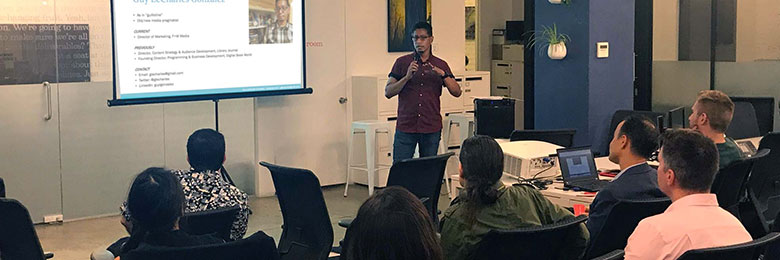No matter how much you love your current job, I believe you should always be open to learning about new opportunities — including applying and interviewing for specific ones that seem interesting, even when you think you’re 100% sure you wouldn’t accept an offer.
And if the opportunity comes to you organically — whether through a professional connection, recruiter, or friend — you should always take the meeting.
That doesn’t mean waste time entertaining potential jobs that don’t meet your basic needs — like salary, responsibilities, benefits, office time, company mission, reputation, diversity, etc. Most of that information can usually be gleaned from the job listing, public information about the company, and/or social profiles of key employees. Few job listings or company websites reveal all of the important intangibles, though, and not everyone’s social profile presents a complete view of what their work experience is really like. You’ll only get that by going through the process, meeting with individual people, and asking the right questions.
You can also never be 100% sure what the actual offer will be until it’s presented, so turning it down before you hear it is unfair to yourself and your career.
Respectful Discretion Advised
Here’s a simple test for how great your job situation really is: Can you tell your boss that you’re interested in and/or interviewing for a new role elsewhere before you get a formal offer?
If the answer is yes, that’s a win-win scenario. I’ve been fortunate to be in that situation a couple of times, and having the conversation was liberating because it let me judge the new opportunity on its own merits. If you do get an offer worth considering, the follow-up conversation with your boss might result in a counteroffer, or it might just make developing a mutually beneficial transition plan a lot easier.
If the answer is no, it doesn’t necessarily mean you have a bad job or boss, it just means you’re caught in the systemic trap that allows companies to lay you off with little to no warning, while you’re expected to give at least two weeks’ notice when you take another job.
Once, I gave my boss a heads-up that I was ready to move on, effectively agreeing on an exit way in advance to give myself room and time to look for something new while putting together a mutually beneficial transition plan. Another time (and a different boss), I told them about a specific opportunity I was exploring before an actual offer was made, a conversation made possible by a commitment to transparency and a history of open communication between us.
Most times, though, I’ll just quietly send in an application or respond to a recruiter’s inquiry whenever something catches my attention. The former rarely goes anywhere and the latter is simply good networking, but the exercise forces me to update my resume and give some hard thought about why the role interests me, especially if a cover letter is required. It also lets me dig a little deeper into a company I’m interested in to learn more about how they operate, deepening my understanding of the industry every time.
In the past, I’ve actually encouraged my own direct reports to update their resumes and give me a current copy so I could give them feedback. I also encouraged them to apply to any external jobs they found interesting, partly to validate their current role was still aligned with their goals, and partly to establish a benchmark for themselves in the job market. Some were understandably suspicious about my intentions at first, but the exercise was totally aligned with one of my primary goals for their ongoing professional development, while also fitting my generally open, candid approach to management.
“But I Really Do Love My Job!”
- Your job is not your spouse. (Unless it is, in which case that’s an outlier with completely different dynamics to consider.)
- Your employer is not your family. (Unless it is, in which case there are other unique intangibles to consider.)
- Your co-workers are not your teammates. (Unless you’re in sports, playing on an actual team, in which case that’s also a whole other can of worms.)
- Your company is not a person. (Sorry, I don’t care what the law says about that.)
No matter how much you love your job and/or the company you work for, there’s nothing wrong with being aware of what other opportunities are available at any given time, and there’s nothing wrong with exploring a different opportunity that might be a similarly good fit for you.
Worst case scenario, you validate how great your job and/or company really is and carry on, potentially reinvigorated! Best case scenario, though, you find an opportunity that checks a box you didn’t realize was important to you and can make an informed, rational decision about your next step.
Do you like email?
Sign up here to get my bi-weekly "newsletter" and/or receive every new blog post delivered right to your inbox. (Burner emails are fine. I get it!)


This is great advice; even though most of us know already what to expect (that “trapped in the system” thing), being open to possibilities and change is always good.
Because you never know when you may need that fallback in two weeks–or after the weekend.
Exactly! It’s all sunshine and roses until the layoffs start, or like I experienced back in 2019, when the company unexpectedly files for bankruptcy and everyone’s jobs are in limbo.
Or they’re absorbed/bought/merged with a larger corporation which gives even less of a fig for the employees.
100%!